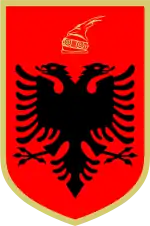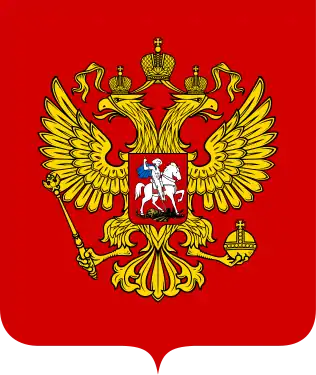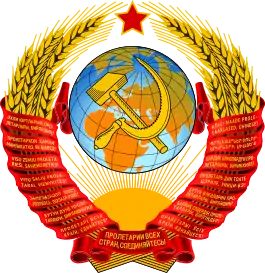Albania–Russia relations
Albanian–Russian relations are foreign relations between the Republic of Albania and the Russian Federation. The establishment of diplomatic relations between Albania and the Soviet Union happened on April 7, 1924. Both countries were also allies in the Warsaw Pact.
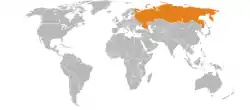 | |
Albania |
Russia |
|---|---|
Albania has an embassy in Moscow. Russia has an embassy in Tirana.
Both countries are full members of the Organization of the Black Sea Economic Cooperation, Organization for Security and Co-operation in Europe, Organisation of Islamic Cooperation (Albania is a member, while Russia is an observer state), and the Council of Europe.
Albania and the USSR
Early Cold War
Because the Soviet Red Army never entered Albania, the Albanians liberated their own nation. Albania had developed very good relations with Yugoslavia, and especially their post-war relations were very good.
Allies
In February 1949, Albania gained membership in the communist bloc's organization for coordinating economic planning, the Council for Mutual Economic Assistance (Comecon). Tirana soon entered into trade agreements with Poland, Czechoslovakia, Hungary, Romania, and the Soviet Union. Soviet and East European technical advisers took up residence in Albania, and the Soviet Union also sent Albania military advisers and built a submarine installation on Sazan Island. After the Soviet-Yugoslav split, Albania and Bulgaria were the only countries the Soviet Union could use to funnel matériel to the communists fighting in Greece. What little strategic value Albania offered the Soviet Union, however, gradually shrank as nuclear arms technology developed.
Rift in the Communist Bloc
During the Sino-Soviet Split, Albania supported the People's Republic of China. This isolated them from the Soviet leadership, and started the Soviet-Albanian split.
After additional sharp exchanges between Soviet and Chinese delegates over Albania at the Communist Party of the Soviet Union's Twenty-Second Party Congress in October 1961, Soviet premier Nikita Khrushchev lambasted the Albanians for executing a pregnant, pro-Soviet member of the Albanian Labor Party's Politburo, and the Soviet Union finally broke diplomatic relations with Albania in December. Moscow then withdrew all Soviet economic advisers and technicians from the country, including those at work on the Palace of Culture, and halted shipments of supplies and spare parts for equipment already in place in Albania. In addition, the Soviet Union continued to dismantle its naval installations on Sazan Island, a process that had begun even before the break in relations.
China
Communist China compensated Albania for the loss of Soviet economic support, by supplying about 90% of the parts, foodstuffs, and other goods the Soviet Union had promised. Beijing lent the Albanians money on more favorable terms than Moscow, and, unlike Soviet advisers, Chinese technicians earned the same low pay as Albanian workers and lived in similar housing. China also presented Albania with a powerful radio transmission station from which Tirana sang the praises of Joseph Stalin, Enver Hoxha, and Mao Zedong for decades. For its part, Albania offered China a beachhead in Europe and acted as Communist China's chief spokesman at the UN. To Albania's dismay, however, Chinese equipment and technicians were not nearly so sophisticated as the Soviet goods and advisers they replaced. A language barrier even forced the Chinese and Albanian technicians to communicate in Russian. Albanians no longer took part in Warsaw Pact activities or Comecon agreements. The other East European communist nations, however, did not break diplomatic or trade links with Albania. In 1964 the Albanians went so far as to seize the empty Soviet embassy in Tirana, and Albanian workers pressed on with construction of the Palace of Culture on their own.
Later developments
In October 1964, Hoxha hailed Nikita Khrushchev's fall from power, and the Soviet Union's new leaders made overtures to Tirana. It soon became clear, however, that the new Soviet leadership had no intention of changing basic policies to suit Albania, and relations failed to improve. Tirana's propaganda continued for decades to refer to Soviet officials as "treacherous revisionists" and "traitors to communism," and in 1964 Hoxha said that Albania's terms for reconciliation were a Soviet apology to Albania and reparations for damages inflicted on the country. Soviet-Albanian relations dipped to new lows after the Warsaw Pact invasion of Czechoslovakia in 1968, when Albania responded by officially withdrawing from the alliance.
Sino-Albanian relations ended by 1978. Even with the Sino-Albanian split, the Albanians refused to normalize relations with the Soviet Union, leaving their country virtually completely isolated from the outside world.
Albania and the Russian Federation
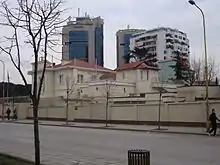
Since the 2008 Kosovo declaration of independence, Russia has mainly backed up Serbia. However the relations between the two countries begin to improve through the organizations they are a part of. Albania's ambassador to Russia as of November 2018 is Arben Gazioni, and Russia's ambassador to Albania is Alexander Karpushin. Within the wider Balkans Albania is considered to be the most pro-EU and pro-Western country in the region and unlike its neighbours (except Kosovo), it has little to negligible support for Russia.[1][2]
Albanian community of Russia
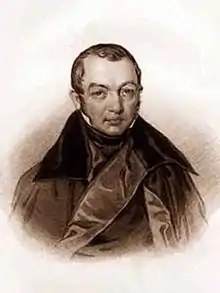 | |
| Total population | |
|---|---|
| 1,300 | |
| Regions with significant populations | |
| Moscow, St. Petersburg, Stavropol Krai, Azov Sea region, Krasnodar Krai | |
| Languages | |
| Albanian, Russian, Serbian | |
| Religion | |
| Eastern Orthodox Church | |
| Related ethnic groups | |
| Russians, Albanians in Serbia, Albanians in Sweden |
High level visits
Hoxha flew in July 1947 to Moscow to conclude a trade agreement with the Soviet Union and engage in further negotiations with Stalin.
In May 1959, Soviet Premier Nikita Khrushchev paid a visit to Tirana in the first visit by a Russian leader to the country. The goal of the visit was to pressure Albania into building Yugoslav–Albanian and Soviet–Albanian relations as well as, according to historian Miranda Vickers, "focus their economy on the growing of citrus fruits rather than concentrate on industrialization". Khrushchev also visited the ancient southern city of Butrint, where he remarked to Soviet Defense Minister Rodion Malinovsky, "Look, how marvelous this is! An ideal base for our submarines could be built here. These old things [reference to archaeological findings] should be dug up and thrown into the sea".[3] The visit was clouded by mutual mistrust, which resulted in his departure from the country two days ahead of schedule.[4]
See also
- Foreign relations of Albania
- Foreign relations of Russia
- Soviet-Albanian Split
- The Great Warrior Skanderbeg – a 1956 co-production of Soviet-Albanian movie
- Albanians in Russia
- Russians in Albania
References
- Ragionieri, Rodolfo (2008). "Mediterranean Geopolitics". In Petricioli, Marta (ed.). L'Europe Méditerranéenne [Mediterranean Europe]. Berlin: Peter Lang. p. 46. ISBN 9789052013541.CS1 maint: ref=harv (link)
- Return to Instability: How migration and great power politics threaten the Western Balkans (PDF) (Report). European Council on Foreign Relations. 2015. pp. 5, 9–11.
- Hoxha 1984, p. 385.
- Vickers 1999, p. 184.
External links
- (in Albanian and Russian) Embassy of Russia in Tirana
- (in Albanian) Nikita kruhschev viaje a Albania 1959
- (in Albanian) hrushovi ne shqiperi-kruscev in albania part 2
